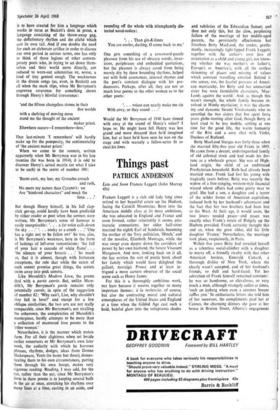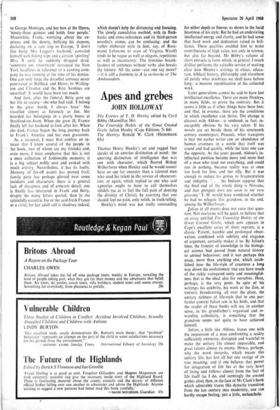Things past
PATRICK ANDERSON
Late and Soon Frances Leggett (John Murray 45s) Frances Leggett is a rich old lady long since retired to her beautiful estate up the Hudson, facing the Catskill Mountains. Born into the American middle class at its most ambitious, she was educated in England and France and soon formed, rather reluctantly it seems, aris- tocratic connections; her older half-sister married the eighth Earl of Sandwich, becoming the mother of the Tory politician, 'flinch,' and of the novelist, Elizabeth Montagu, while she was swept even deeper down the corridors of power by her own husband, the future Viscount Margesson. And now, looking back on it all, she has written the sort of poetic book about her family which would have delighted the gallant, nostalgic Proust and at least in- trigued a more austere observer of the social scene such as Henry James.
For this is a thoroughly ambitious work, not least because it weaves together so many important themes: a la recherche, of course, but also the contrasting moral and cultural atmospheres of the United States and England at a time when the Gilded Age cast such a bold, baleful glare into the voluptuous shades and subtleties of the Edwardian Sunset; and then not only this, but the slow, perplexing failure of the marriage of her middle-aged parents, the persistently affectionate but frivolous Betty MacLeod, the tender, gentle- manly, increasingly tight-lipped Frank Leggett; together with the author's own loss of orientation as a child and young girl, not know- ing whether she was mother's or father's, Europe's or. America's, with all the restless skimming of places and missing of values which constant travelling entailed. Behind it one senses, too, the fearful pressure of Ameri- can matriarchy, for Betty and her unmarried sister Joe were formidable characters, 'Mac- Leods against the world.' And, as though this wasn't enough, the whole family became in- volved in Hindu mysticism; it was the charm- ing and dynamic Swami Vivekananda who so unsettled the two sisters that Joe spent forty years globe-trotting after God, though Betty at least tried to be less mobile, settling at one time for the good life, the warm humanity of the Ritz and a cosy chat with Violet, Duchess of Rutland.
Betty MacLeod Sturges was forty-three when she married fifty-five year old Frank in 1895. He came from a decent, undistinguished family of old colonial stock and had made his for- tune as a wholesale grocer. She was of High- land origin, the child of an embittered Presbyterian household. Both had already been married once. Frank had lost his young wife tragically years before; Betty was recently the widow of a free-ranging, western-style financial wizard whose affairs had come pretty near to grief. She had a son, a daughter and a terror of the wilder forms of American capitalism, induced both by her husband's adventures and the fact that her two brothers had been lost to the West. At their age, it would seem, the two lovers needed peace—and peace , was exactly what Frank's estate of Ridgely up the Hudson provided. Frank certainly thought this and so, when she grew older, did his little daughter 'France.' Nevertheless, the marriage took place, suspiciously, in Paris.
Within five years Betty had revealed herself as a relentless social-climber with a daughter to marry off, a friendly rivalry with that other American hostess, Emerald Cunard, a thorough dislike of New York, where she clearly wasn't accepted, and of her husband's friends, so dull and hard-faced. Yet her adoration of Frank himself remained constant: he was so handsome, so chivalrous, so very much a man, although strangely sullen at times, `such an iceberg when even a summer breeze ruffles you.' In enthusiastic letters she told him of her successes, the compliments paid her at Cannes, the charming dinners she gave at her house in Bruton Street, Alberta's engagement to George Montagu, and her box at the Opera, 'ninety-three guineas and holds four people.' Meanwhile, Frank, worrying about the ex- penses and the dowry, bullying his stepson, declaring on a rare trip to Europe, `I don't like being Mrs Leggett's husband,' consoled himself with fishing trips and a certain 'sporting' Miss X until he suddenly dropped dead. 'SARDINES ARE UNSETTLED' screamed the New York headlines in reference to a canning com- pany he was running at the time of his demise. One can only hope the dreadful sentence never penetrated to Welbeck and Hever, to Watling- ton and Cliveden and the Ritz. Sardines are unsettled! It would have been too much.
And then, after the, funeral, Betty gave up her life in society—she who had said, 'I belong to the great world, I always have.' She travelled almost as furiously as Joe. She hoarded her belongings in a pretty house at Stratford-on-Avon. When she grew ill, France finally left her husband to look after her. When she died, France began the long journey back to Frank's America and her own grassroots.
As a reviewer, I must first confess an in- terest (for I know several of the people in the book, two of whom are my friends) and, even more, I must emphasise that this is not a mere collection of fashionable memoirs; it is a big subject nobly seen and evoked with much artistry. Nevertheless, it has its faults. Memory of far-off events has proved frail; family piety has perhaps glossed over some incidents and characters; there is a general lack of sharpness and of concrete detail; one is finally less interested in Frank and Betty, despite the many letters quoted, than in the splendidly eccentric Joe or the acid-fresh France as a child, for her adult self is shadowy indeed, which doesn't help the distancing and focusing. The slowly cumulative method, with its flash- backs and cross-references and its Third-person novelist's stance, can be confusing; and the rather elaborate style (a hint, say, of Rosa- mund Lehmann or even of Virginia Woolf) tends to be vague as well as elegant, repetitious as well as incantatory. The feminine breath- lessness of sentences without verbs also breaks the texture. All the same—can one say more? —it is still a footnote to A la recherche or The Ambassadors.







































 Previous page
Previous page